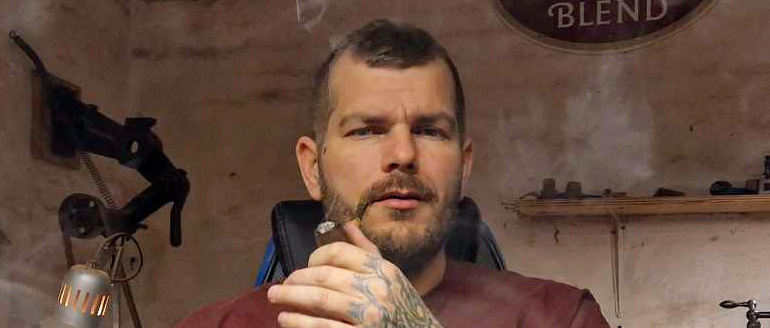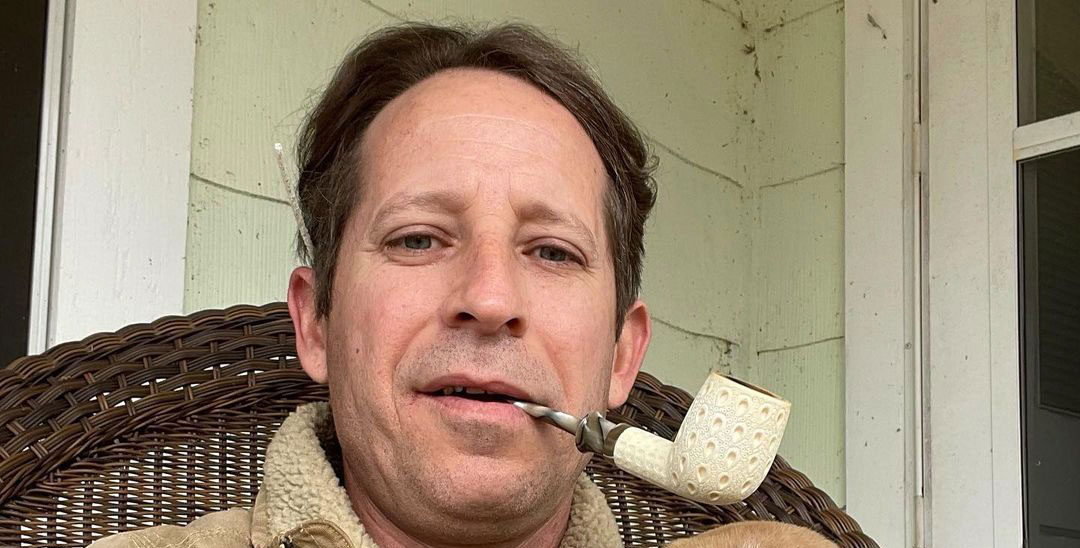By C. R. S. Lyles This is the place referenced in the countless examples of a dystopian future; these are the limits of human control.
This is the place referenced in the countless examples of a dystopian future; these are the limits of human control.
Since the 1600s, those in power have wanted nothing more than to bring the use of tobacco under their jurisdiction, either to control its sale or to eradicate it altogether. Beginning with James I, the tyranny of tobacco’s opposition has grown in its methods and goals, and yet the underlying motivation remains unchanged.
Last July, the University of Florida initiated a campus-wide ban of tobacco use on all of its properties, becoming one of the first major universities in Florida to do so.
The ban, stemming from an initiative put forth by the Healthy Gators Coalition, a branch of the Alachua County Health Department, outlawed "the personal use of any tobacco product, whether intended to be lit or not, which shall include smoking…, as well as the use of an electronic cigarette or any other device intended to simulate smoking and the use of smokeless tobacco, including snuff; chewing tobacco; smokeless pouches; any other form of loose-leaf, smokeless tobacco; and the use of unlit cigarettes, cigars, and pipe tobacco."
 Dr. Jane Emmerée, a former participant in the coalition, stated that "The mission of the coalition is to create an environment supportive of the development and maintenance of a healthy body, mind and spirit for all members of the University of Florida community"
Dr. Jane Emmerée, a former participant in the coalition, stated that "The mission of the coalition is to create an environment supportive of the development and maintenance of a healthy body, mind and spirit for all members of the University of Florida community"
Borrowing this mantra from Dr. Jill Varnes, the former vice chair of the Coalition, and Dr. Steve Dorman, the current vice chair, the statement itself, while understandably benevolent in its intention, begs the question, How does eradicating smoking develop or maintain a healthy mind or spirit for current smokers?
Yes, smoking is bad for the body, there’s been multiple reports and blah blah blah. That’s not the issue here.
The issue is that banning smoking on a public property is not only ill-advised, but can’t be enforced because smoking isn’t illegal.
Though the proponents of health care reform and the anti-smoking crusade would like nothing more than for tobacco to be illegalized, the fact remains that it is not, and the revenue it generates inadvertently pays for the aforementioned anti-tobacco proponents to continue with their vendetta.
Which, of course, brings up the issue of how to enforce a policy which is unfounded in any vestige of legality? The answer, simply put, is through fear.
 For example, the other day a young student was caught by a police officer on the University of Florida campus while having a cigarette. The officer ridiculed and harassed the student for several minutes, reminiscent of a Gestapo-esque authority, before allowing the student, who had put out the cigarette when asked, to leave.
For example, the other day a young student was caught by a police officer on the University of Florida campus while having a cigarette. The officer ridiculed and harassed the student for several minutes, reminiscent of a Gestapo-esque authority, before allowing the student, who had put out the cigarette when asked, to leave.
There was no citation given, no arrest, nothing. Nothing more than a lecture on the student’s personal health choices and how said choices were affecting the other students and, more importantly, the environment.
Since when did police officers have the authority to curb an individual’s behavior based on how that would affect the environment? Sure, if a student is opening up ten thousand aerosol cans simultaneously, then an intervention could be justified. But smoking? As referenced in the first part of this series, the self-satisfaction of the anti-smoking crusade knows no bounds.
Which leads into another component of their vendetta: the various advertising techniques that they choose to use in order to ensnare and confuse the smoking community.
For example, on January 12th of this year, the local independent newspaper of Gainesville, The Alligator, ran an advertisement which read:
"SMOKING STUDY: Do you smoke? Do you have a New Year’s resolution to QUIT SMOKING? The Alachua County Health Department is looking for young adults who drink alcohol and are interested in receiving a new treatment to help them quit smoking."
In researching why the advertisement specifically called for "young adults who drink alcohol", a representative of this particular division of the Alachua County Health Department stated that the program was designed to "look for a correlation between binge drinking and smoking."
 Dr. Steven Pokorny, the head of this division, was unable to be reached for comment regarding this article in time for its publication, but the representative was able to provide a cursory background on the history of this program.
Dr. Steven Pokorny, the head of this division, was unable to be reached for comment regarding this article in time for its publication, but the representative was able to provide a cursory background on the history of this program.
Beginning in July of last year (coincidentally coinciding with the campus-wide tobacco ban at UF), the program was designed to track how alcohol, and specifically binge drinking, affects smoking levels.
The program did stress that it is not encouraging students or young adults to binge drink, but is merely interested in tracking the correlation between the two.
This study is interesting for two main reasons: one, it is propagating the same myth begun over four hundred years ago by James I as an excuse to ban tobacco use, and two, it assumes (though not explicitly stated) that people who smoke are probably more likely to drink, and possibly to excess.
Smokers have a bad reputation, and always have, but to presume that a smoker is not only going to spew dangerous carcinogens into your children’s lungs but also drink to the point of blacking out is somewhat offensive.
The goal behind the initiatives at UF and the Alachua County Health Department are benevolent in nature, meaning they really do only want the health of our state and our nation to exceed the rest of the world’s because, frankly, America’s system of democracy makes it one of the few nations in the world that can become the healthiest. But the nature of being an American is having the freedom to choose, and while we have the capability to become the leader in world health care, it doesn’t mean we have the capacity.
People always will enjoy doing things which are slightly bad for them. Fast food, drinking, smoking, gambling…it’s the nature of freedom. We’re allowed to be a little stupid now and again, and the ability to do so is what smoking bans and health studies such as these detract from.
The people at the forefront of changing health care and how we treat our bodies are, in my experiences, kind, polite, and good-hearted people, but their participation in these endeavors is woefully misguided. As stated in the first installment of this series, smugness can be just as deadly as carbon-emissions, secondhand smoke, or chlorofluorocarbons.
But smugness, unlike those elements, brings a much more harmful effect than death with it. In lieu of mortality, smugness seeks to control the life choices and morality of the mass populous, all in the name of the all-mighty greater good.
Related Article: The Smug Alert (Part 1)

Carter R. Lyles is a student at the University of Central Florida in Orlando, FL and at the University of Florida in Gainesville. He is a journalism/psychology major, and in addition to his work at Pipes Magazine, he has contributed articles to The Alligator, Thursday Night Magazine, and The Fine Print. |

















Thanks for the illuminating article. Although it preaches to the choir, so to speak, it’s important to be aware of the initiatives at UF and the Alachua County Health Department.
“The mission of the coalition is to create an environment supportive of the development and maintenance of a healthy body, mind and spirit for all members of the University of Florida community”
Ok, but how is anyone else’s health any of your business? How is what the Healthy Gators Coalition define as healthy the same as what everyone else defines as healthy?
There is also mental health. If having a smoke makes some feel better mentally, than taking that away harms their mental health.
You can make all the reasonable remarks you want. This isn’t about reason, it is about control and hate. Every time “they” can prohibit you from doing something “they” come closer to control over what you actually DO. Do you really think “they” are concerned about the general health of the population? Then why do “they” allow so many fast food franchises to be set up? Why do “they” allow so many additives to be put into your food? If “they” are so concerned about the general welfare of the populace, why are prescription drugs cheaper in Canada? Why is the wide s spread use of high fructose corn syrup allowed in food products? It’s not about health, it’s about control.
I actually just wrote a letter to my college (Washington University in St. Louis) to try to get pipes to be exempt from our newly enforced smoking ban. I don’t think the ban should be there at all, but one step at a time, you know? Here’s a copy:
“A bearded professor is sitting on a bench on his university’s quad, enjoying a break between classes and watching the clouds float overhead on a warm, summer day. While people watching, he pulls out his old Dunhill pipe, packed gently with Prince Albert tobacco. Putting match to tobacco, exhales a ring of smoke and sweet aroma. Returning his attention from his pipe to the quad, he sees a campus security officer approaching him. “Put that thing out,” he said, and hands the professor a ticket.
Being raised in a local restaurant and jazz-club, I saw first-hand the wonderful effect that not allowing smoking in an establishment has; however, the wonderful result was because of the lack of cigarette smoke, not all smoke in general. A sight similar to the one previously described is the event that changed me from ardent supporter of Washington University’s campus-wide smoking ban to hazarding to suggest that there need to be certain exceptions. The smoking ban is noble in intention, and has had many great results, but it spans further than is needed. Washington University’s campus-wide smoking ban should not apply to pipes because, though they are tobacco products, they are not nearly as contentious or dangerous as cigarettes. To show this, I will take the main reasons for the ban, one by one, and attempt to show that they are either not applicable to pipes whatsoever, or not significantly so; I will then address possible concerns to allowing pipes to be exempt from the ban.
According to proponents and designers of Wash-U’s smoking-ban, along with supporters of other outdoor smoking-bans, there are two primary reasons for the restriction: a more pleasant environment and the dangers of second-hand smoke. As for the first justification, there are two main prongs to this. First, the smell of the smoke: most pipe smokers are frequently approached and complimented on the aroma of their pipe tobacco, which is often flavored with cherry or vanilla. They are told that it reminded the person of a grandfather or uncle who used to smoke a pipe. This, coupled with the number of pipe smokers, which is so insignificant in comparison to cigarette smokers, makes it unlikely that their presence would be noticed and, if it is, even more unlikely to offend. As for the trash caused by cigarettes, this again does not apply to pipes; when a pipe is finished, the tobacco is simply ash and leaves, biodegradable substances that are barely noticeable and cause no detriment to the environment. The first of the two justifications for the ban on smoking is not applicable to pipes.
The concern of second-hand smoke is very real. However, the majority of the carcinogens from cigarettes comes from the chemicals sprayed on the plant prior to harvesting and from the machines used in production. These two factors are not present within pipe-tobacco and the amount of carcinogens is thus exponentially reduced. The amount of smoke to which one is exposed is another factor involved. As was previously mentioned, the number of pipe smokers is minute, thus the amount of exposure would be minute, as well. Additionally, the average pipe smoker enjoys far less tobacco on average than the average cigarette smoker smokes; once again, this would mean there would be less exposure. Thus, though smoke is still present with pipes, the danger is far less than with cigarettes.
I would imagine that this exception would cause a number of concerns. One of the first would be that there would be an increase in pipe-smoking. This is extremely unlikely, as pipes are not used to attain a chemical fix as cigarettes are. Thus, those who smoke cigarettes for a nicotine fix, as most do, would find no solace in the humble pipe. Another possible complaint is that it is unfair to allow one tobacco medium and not another; so be it. There are a number of private communities that allow people to own a golden retriever but not a pit-bull; both are dogs and both pose potential risks, but one is so much more hazardous than the other that one is forbidden while the other is allowed.
Pipes are a totally different breed than cigarettes and should not summarily be banned simply
because they are similar. Pipes are cleaner, less offensive, non-addicting, and safer. For these reasons,
the all-encompassing smoking-ban on campus should be amended to allow for the smoking of pipes.”
I am a huge fan of tobacco (and I also like to drink some spirits from time to time, mainly rum, although I take great care on drinking as I once almost fallen into alcoholism) and coffee. I like my pipes, I smoke daily and I have the great opportunity of living in a country where we have a smoking lounge at the office and 99% of the bars and pubs allow smoking (And that’s about it with the advantages of living in Eastern Europe 🙂 ). Although I am a man prone to vice, I can not say that I agree for example with the consumption of drugs (marijuana etc.) and neither the crappy legal stuff they call etno-botanics. Is there a difference between alcohol,cofee,tobacco and marijuana. How would you react if you would find a kid smoking pot at the entrance, not to mention that one night while I was going on the rooftop of my building to enjoy a cigar I found two guys with syringes in their veins?
Seeing this crusade against smoking makes me sick as the real dangers out there although more or less illegal run free. For example, marijuana appears in a lot of movies lately, while tobacco smokers if there are any are usually the “bad-guys”. I had the chance of seeing what a few joints smoked weekly can do to a person, sometimes smart people. Result: at least as bad as the excess of alcohol.
The urge to save humanity is almost always a false-front for the urge to rule it.\
-H. L. Mencken